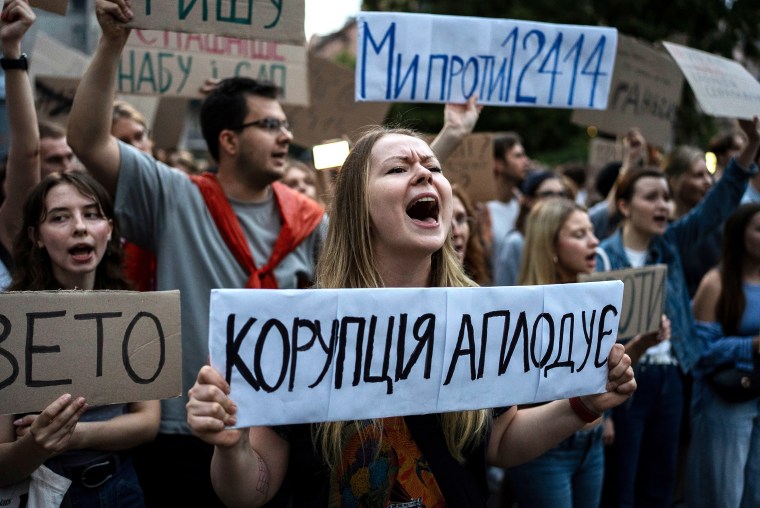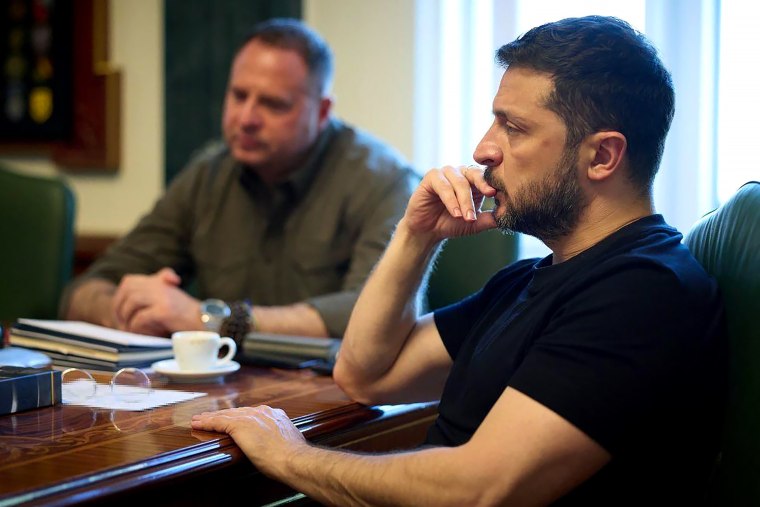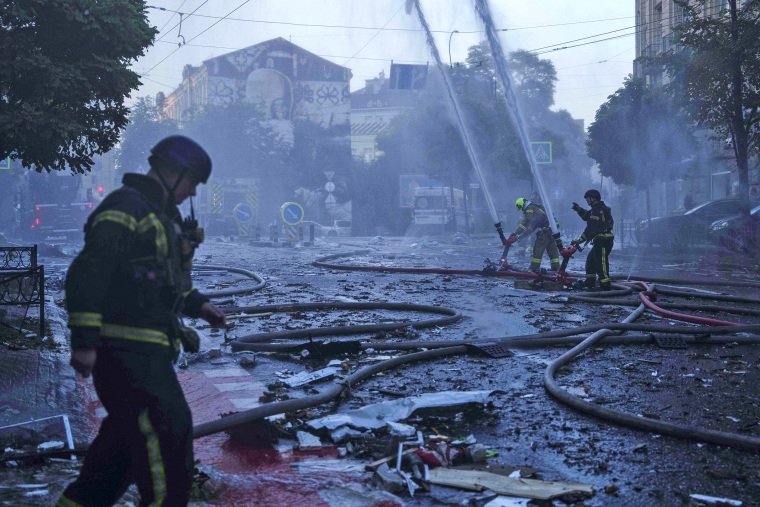KYIV, Ukraine — Ukrainian fury was fixed Wednesday on its own government.
As Russian drones peppered their homes, their loved ones fought in trenches and their negotiators waded through more pessimistic diplomacy, Ukrainians waged a new battle on the streets of Kyiv and other major cities.
Activists called for further protests Wednesday over a law signed by President Volodymyr Zelenskyy that curbs the country’s top two anti-corruption agencies. The move already fueled the first major demonstrations since Russia launched its full-scale invasion in 2022, and drew alarm from European officials and experts.
“Destroy Russians, not democracy,” one of the hastily drawn cardboard signs in Kyiv read, while crowds yelled “Shame!” and “Veto the law!”
Natalia, 48, a therapist who like many in this febrile atmosphere doesn’t want to use her last name, said trying to restrict anti-corruption agencies risked “endangering the values of freedom, democracy in our country and the future of our children.”
She sees the protests as a way to support the army on the front lines. “I am coming out to give them a signal that we are here,” she said, “so that we are not stolen and betrayed.”
The sudden crisis could offer the Kremlin a powerful propaganda tool and threaten not just Ukraine’s unity, but also its support from the West at a crucial moment in the war.
Parliament had swiftly passed the law giving Zelenskyy’s prosecutor general sweeping powers over the National Anti-Corruption Bureau and Specialised Anti-Corruption Prosecutor’s Office. He said he did this to make them more efficient and to clear out “Russian influence,” but critics feared it would further enhance the power of his divisive inner circle.
It prompted howls of outrage and dismay, not just from Ukrainians themselves, but also Western officials and experts alarmed that the country could be backsliding on its endemic graft problem. It comes a week after the arrest of a prominent anti-corruption campaigner who had embarrassed senior officials with investigations into their affairs.

All of this overshadowed a third round of peace talks between Russia and Ukraine set to begin Wednesday in Istanbul.
Though both sides remain pessimistic of serious progress, these are the first discussions since President Donald Trump gave Russian President Vladimir Putin a 50-day ultimatum to agree to a truce or face new tariffs. Most observers expect another prisoner exchange but little else.
Many Ukrainians are also worried that Zelenskyy’s move will be weaponized by the country’s opponents as evidence of the corruption they say makes supporting Kyiv untenable.

The head of Ukraine’s military intelligence, Kyrylo Budanov, even appeared to question the move, warning that “Ukrainian history has taught us that a nation loses if it is torn apart by internal contradictions.”
Ukraine’s endemic corruption is one of the reasons it has not been accepted into the European Union and NATO.
Marta Kos, the E.U.’s commissioner for enlargement, said she was “seriously concerned” about the new law, which she called a “serious step back.”
Responding to the criticism Wednesday, Zelenskyy gathered with the heads of the anti-corruption agencies, as well as law enforcement chiefs and the prosecutor general.
“We all hear what society is saying,” he said in a statement, promising measures to “strengthen the work of each institution.”

He added, “We all share a common enemy: the Russian occupiers. And defending the Ukrainian state requires a strong enough law enforcement and anti-corruption system — one that ensures a real sense of justice.”
It also requires air defense against the nightly waves of drones launched by Russia.
Overnight, it shot down 27 of 71 unmanned aircraft, with those that got through killing at least four people and injuring more than 40 across Kherson, Donetsk, Sumy and Kharkiv, officials said.
On the ground, Russian forces continue to make grinding gains in eastern Ukraine, including enveloping the key town of Pokrovsk, in the Donetsk region, according to the Institute for the Study of War, a think tank in Washington.
Though many analysts believe Russia’s hemorrhaging of men and military equipment will soon begin to tell, morale is frayed for many.
“They won’t stop until we surrender,” said Agneshka Shyba, 23, who works in social media. “Frankly speaking, I am exhausted.”
Daryna Mayer reported from Kyiv, and Alexander Smith from London.




